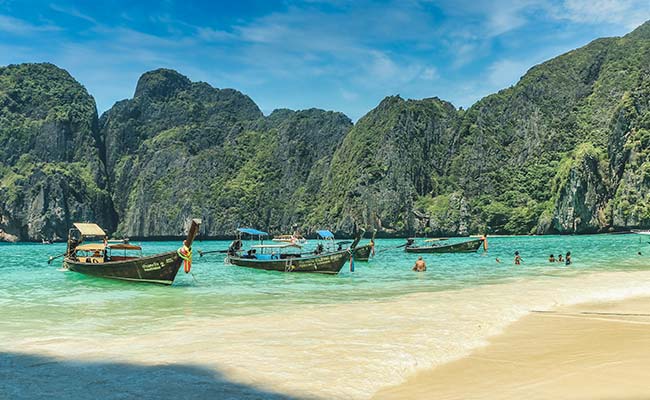Zero-dollar tours refer to travel packages sold at incredibly low prices, sometimes even for free. These tours are primarily marketed to budget-conscious travelers, with Chinese tourists being the most common target.
While many travelers opt for group tours due to the convenience of having all logistics handled by agencies, some tour operators, in an effort to draw in more customers, offer “zero-dollar tours” that claim to include transportation, accommodation, and meals at no upfront cost.
The key to the business model is that while the initial cost of the tour is minimal, upon arrival tourists are taken to specific shops, restaurants, and attractions where they are pressured into making purchases at inflated prices. The tour operators earn commissions from these businesses, which is how they offset the low or zero initial tour price.
Thailand is a major destination for zero-dollar tours, where gaps in local regulations have allowed this questionable business practice to flourish.

How Zero-Dollar Tours Work
You've no doubt seen them in Bangkok or Chiang Mai: coach-loads of Chinese tourists being herded like cattle by a guide with a red flag, moving hurriedly from one place to another.
The tour guide plays a crucial role as both a facilitator and an influencer. Their primary responsibility is to lead the tourists through the itinerary, which is designed around visits to specific shops and factories. These stops are a key part of the tour's business model, as the profits from tourist purchases are what make the tours financially viable.
The tour guide's influence is significant because they are responsible for encouraging, and sometimes pressuring, tourists to make purchases at these designated locations. This can involve highlighting the quality or uniqueness of the products, sometimes exaggerating their value to persuade tourists to buy. The tour guide may also emphasize that shopping is an integral part of the cultural experience, further nudging tourists towards spending.
Additionally, the tour guide often acts as the main point of communication between the tourists and the businesses involved in the tour. They may be responsible for coordinating logistics, managing group dynamics, and ensuring that the tour adheres to the itinerary designed by the tour operator.
The tours are booked outside of the host country. Their operation relies on taking advantage of gaps in local regulations, such as proxy shop ownership and enabling the operator to set up the funnel
Many of the shops tourists are taken to have large parking areas filled with tour buses, yet they usually remain off-limits to the general public. The shops are often run or owned by Chinese nationals and typically sell Chinese-made products, with payments processed through Alipay or WeChat.
This practice diverts revenue away from the local economy, funneling it instead into the hands of those involved in the scheme.
The Origin of Zero-Dollar Tours
Zero-dollar tours originally started in China as a domestic phenomenon, with trips arranged for as low as $9. The model was then adapted to trips abroad, with Thailand and Indonesia being prime locations.
Despite China’s Tourism Law prohibiting travel agencies from offering trips at unrealistically low prices as a means to lure tourists and earn commissions from arranged shopping or extra paid activities, The South China Morning Post has reported incidents of harassment on domestic tours. I quote:
In February, a family was told to leave a tour bus by the guide after they refused to buy a gold bracelet costing 50,000 yuan (US$7,000) while traveling in the renowned tourism province of Yunnan in southwestern China. In another incident in the same province in June 2023, a guide berated passengers who refused to shop.
Impact on Thailand's Travel Industry
Overpriced goods, dull itineraries, and compulsory shopping stops are all tactics of this shady tour business. And this mafia-style operation has serious ramifications for Thailand's tourism industry.
1. Erosion of the Cultural Travel Experience
Zero-dollar tours prioritize commercial stops over cultural or scenic experiences, leading to a diminished travel experience. Tourists are rushed from one shopping stop to another, with limited time to explore the historical sites, temples, or natural parks that Thailand has to offer.
Tourists can end up feeling harassed and manipulated, and may leave with a negative view of Thailand’s business practices, believing that they have been scammed or overcharged, which discourages future visits.
2. Undercutting Legitimate Operators
Legitimate tour operators who charge fair prices for quality services find themselves undercut by the extremely low prices of zero-dollar tours. This can lead to a race to the bottom in pricing, compromising the quality of services offered by the broader tourism industry.
While a few businesses benefit from the influx of tourists brought by zero-dollar tours, the wider local economy suffers. Smaller businesses that do not have the means to participate in these arrangements lose out on potential revenue, leading to an economic imbalance where only a select few thrive at the expense of the broader community.
3. Deceptive Practices
Tourists who purchase these tours often find themselves misled. What was advertised as a comprehensive and enjoyable travel package quickly turns into a series of forced shopping trips.
The high prices and pushy sales methods associated with zero-dollar tours can tarnish the reputation of the local market, leaving tourists disappointed and spending far more than they had anticipated. While some may be strong enough to resist the pressure, vulnerable individuals, such as the elderly, often succumb to the aggressive sales tactics.
Moreover, in some cases, the quality of goods and services offered is poor, leading to further dissatisfaction.
5. Legal and Regulatory Challenges
The Thai government has struggled to regulate these tours, as they often operate in a legal gray area and do not take on the form of a typical scam.
The Tourism Authority of Thailand (TAT) has been working toward stricter regulations, better enforcement, and increased promotion of sustainable and culturally enriching tourism. However, the persistence of such tours highlights the need for educating tourists about the risks of ultra-cheap travel packages, and encouraging support for legitimate, culturally focused tours are essential in protecting Thailand’s tourism industry.
When booking a tour, one should keep in mind the old adage, ‘If the price seems too good to be true, it probably is.
——-
Have you experienced a zero-dollar tour? Have you ever felt pressured into buying products on an organized trip? Share your experience below.
Tips to Start Planning Your Trip Now:
Book Your Accommodation
Best hotel rates are found at Agoda and Hotels.com.
Don’t Forget Travel Insurance
Travel insurance protects you against illness, injury, theft, and cancellations. I never travel without it. I’ve been using SafetyWing for years. You should too.
Considering a Backpack?
Check out this guide for the best options.
Last Updated on



Leave a Reply